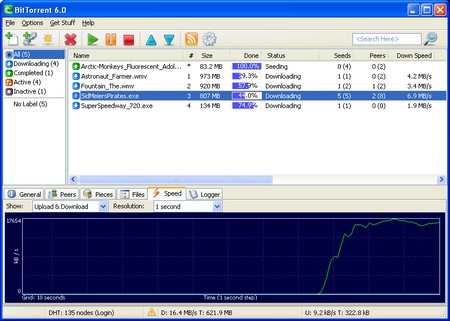


Discover how BitTorrent revolutionized file sharing with peer-to-peer technology. Learn about its technical advantages, real-world applications, security considerations, and performance optimization strategies for modern users.
Version: 7.11
In the landscape of digital file distribution, few technologies have proven as transformative and enduring as BitTorrent. This peer-to-peer protocol fundamentally altered how we think about file sharing, bandwidth efficiency, and decentralized networks. From its humble beginnings in 2001 to its current status as a cornerstone technology powering everything from legitimate software distribution to content delivery networks, BitTorrent continues to demonstrate the power of distributed computing.
At its essence, BitTorrent operates on a beautifully simple premise: instead of downloading a file from a single source, the protocol breaks files into small pieces and distributes them across multiple computers simultaneously. This approach, known as peer-to-peer networking, eliminates the bottlenecks inherent in traditional client-server models.
When you initiate a BitTorrent download, you're not just receiving data—you're also contributing to the network by sharing pieces you've already downloaded with other users. This symbiotic relationship creates remarkable efficiency gains, particularly for popular files where numerous peers can contribute bandwidth simultaneously.
The protocol utilizes specialized files called torrents, which contain metadata about the target files and information about tracker servers that coordinate the peer discovery process. These compact torrent files typically measure just a few kilobytes, yet they enable the distribution of massive datasets across global networks.
Having worked extensively with various file transfer protocols throughout my career, I've consistently found BitTorrent's technical advantages compelling. The protocol's ability to scale bandwidth consumption based on availability represents a paradigm shift from traditional download methods.
Consider a scenario where a popular Linux distribution releases a new version. Traditional HTTP downloads would overwhelm the hosting servers, creating bottlenecks and failed transfers. BitTorrent, however, thrives in these conditions. As more users download the distribution, they simultaneously become sources for other users, creating a self-reinforcing network effect that actually improves performance under high demand.
The protocol's built-in error checking and piece verification ensure data integrity throughout the transfer process. Each piece undergoes cryptographic hash verification, preventing corruption and maintaining file authenticity. This robust error handling has made BitTorrent particularly valuable for distributing critical software updates and system images where data integrity is paramount.
While BitTorrent initially gained notoriety through file sharing communities, its applications have expanded dramatically across legitimate enterprise and consumer use cases. Major game publishers now leverage BitTorrent protocols for distributing massive game updates, reducing their content delivery costs while improving download speeds for users.
Facebook famously implemented BitTorrent protocols for internal server deployments, enabling rapid distribution of software updates across thousands of servers in their data centers. This implementation demonstrated how the protocol's efficiency scales even within controlled enterprise environments.
Academic institutions have embraced BitTorrent for distributing large research datasets, course materials, and software packages. The University of California system, for instance, uses BitTorrent to distribute virtual machine images and software installations across their campus networks, significantly reducing bandwidth costs and improving deployment times.
The BitTorrent ecosystem has matured significantly since the protocol's early days. Modern clients like qBittorrent, Transmission, and the official BitTorrent client offer sophisticated features that extend far beyond basic file transfers.
These contemporary implementations include bandwidth limiting, scheduled downloads, RSS feed integration for automated content retrieval, and advanced queue management systems. Many clients now support streaming capabilities, allowing users to begin consuming media content before downloads complete—a feature that bridges traditional downloading with modern streaming expectations.
The integration of magnet links has streamlined the user experience by eliminating the need to download separate torrent files. These cryptographic hashes enable direct connections to torrent swarms, reducing friction in the sharing process while maintaining the protocol's decentralized nature.
From a security perspective, BitTorrent presents unique challenges that require careful consideration. The protocol's peer-to-peer nature inherently exposes IP addresses to other network participants, raising privacy concerns for users in restrictive environments.
Virtual Private Networks (VPNs) have become essential tools for privacy-conscious BitTorrent users, encrypting traffic and masking IP addresses. However, not all VPN services effectively support P2P protocols, making provider selection crucial for maintaining both performance and privacy.
Modern BitTorrent implementations have introduced protocol encryption and peer exchange mechanisms that enhance privacy and circumvent basic traffic shaping attempts by internet service providers. These improvements demonstrate the protocol's ongoing evolution in response to changing network environments.
Maximizing BitTorrent performance requires understanding both the protocol's mechanics and your network environment. Port forwarding remains crucial for optimal connectivity, as it enables incoming connections from peers who might otherwise be unable to establish direct communication.
Upload bandwidth allocation significantly impacts download performance due to the protocol's tit-for-tat mechanism, which prioritizes connections with peers who contribute data in return. Setting upload limits too low can actually decrease download speeds, as other peers may deprioritize your connection requests.
Connection limits require careful tuning based on available bandwidth and system resources. Too few connections limit potential sources, while excessive connections can overwhelm network hardware and reduce overall efficiency. Most modern clients provide automatic optimization, but understanding these parameters enables fine-tuning for specific use cases.
As we look toward the future, BitTorrent continues evolving to address contemporary challenges. The protocol's fundamental principles of distributed load sharing and decentralized architecture align perfectly with current trends toward edge computing and distributed systems.
Emerging technologies like blockchain-based storage networks and decentralized web protocols draw inspiration from BitTorrent's peer-to-peer foundations. These developments suggest that the core innovations behind BitTorrent will continue influencing how we architect distributed systems for years to come.
The protocol's resilience and efficiency have proven particularly valuable during global events that stress traditional content delivery networks. When centralized services struggle under exceptional demand, BitTorrent's distributed nature often provides more reliable access to critical resources.
BitTorrent represents more than just a file sharing protocol—it embodies a fundamental shift toward distributed, collaborative computing that continues resonating throughout modern technology. Its technical elegance, combined with practical benefits like improved bandwidth utilization and enhanced scalability, ensures its continued relevance in our increasingly connected world.
For technology professionals and enthusiasts alike, understanding BitTorrent provides valuable insights into distributed system design and peer-to-peer networking principles that extend far beyond file transfers. As we continue building more resilient, efficient networks, the lessons learned from BitTorrent's success story remain more relevant than ever.
| License: Free |
| Category: Internet Software |
| Platform: Windows |
| Operating System: Windows 98/Me/NT/2000/XP/2003/Vista/Server 2008/7/8 |
| Last Updated: Aug 08, 2025 |
| Version: 7.11 |
| Downloads: 24.5M+ |
| User Rating: 0.0/5 (0 reviews) |
| File Size: 1.75MB |
| Price: FREE |
Be the first to review this application!